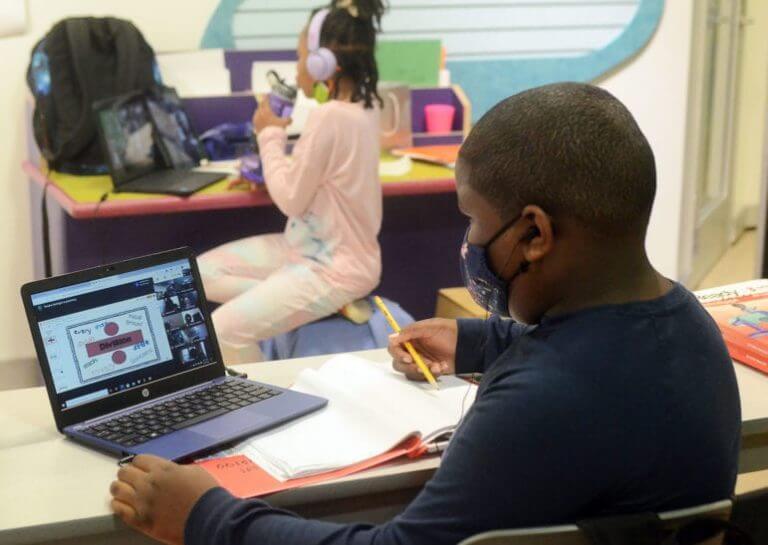
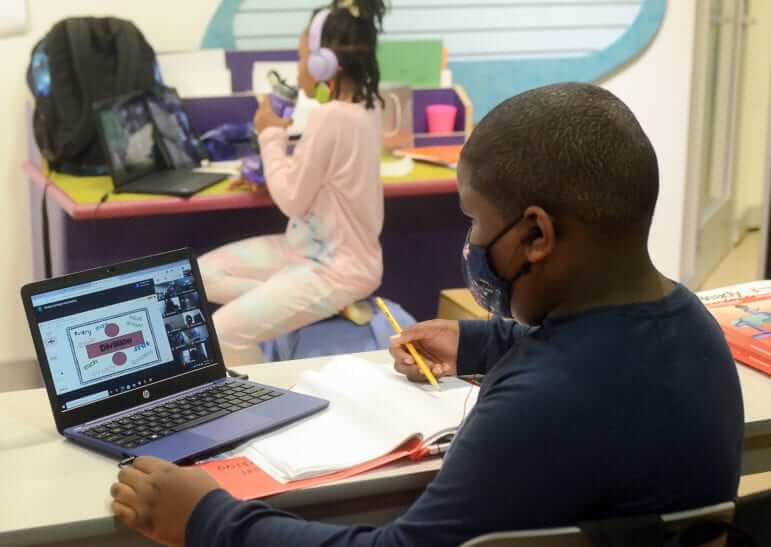
Vickie D. King/Mississippi Today
Xavier Showers, 8, joins classmates via Zoom for math class Wednesday morning at the Mississippi Children’s Museum.
A total of 24 day cares, nonprofits, churches and other organizations from across the state received a total of $5.4 million in funding this fall to care for and educate children under 5-years-old during the pandemic.
Gov. Tate Reeves issued the first round of allocations from the Governor’s Emergency Education Relief (GEER) Fund in recent weeks. The purpose of the money, a part of the Coronavirus Aid, Relief, and Economic Security (CARES) Act, is to enable governors to decide how best to meet the needs of students, schools and other education-related organizations impacted by COVID-19. Mississippi received a total of $34.6 million.
The largest amount in the first allotment of funding was to Waterford.org, a Utah-based education nonprofit that has been piloting a virtual program for pre-kindergartners in Mississippi for several years. The group received nearly $2 million to expand its existing program to nearly 2,500 preschool-aged children.
The next largest awards were to the Boys & Girls Clubs of the Gulf Coast for around $870,000, and the Boys & Girls Clubs of Central Mississippi for about $436,000.
Waterford.org has been operating in collaboration with partners across the state, including the Mississippi Head Start Association, to offer a supplement to pre-kindergarten, said LaTasha Hadley, vice president of state education partnerships. Since 2016, the program has been offered to 3,639 low-income children in areas of the state where literacy scores were low.
The GEER funding has made it possible to serve additional students who were on the waiting list to participate in the existing program, explained Hadley. All Mississippi families with 4-year-olds are eligible to enroll regardless of income, and the deadline for application is Nov. 1.
“Mississippi is taking the lead in not only investing in innovative early education efforts during the pandemic, but also in recognizing the need for wide educational partnerships such as the Waterford Upstart Pandemic Recovery Path program,” said Reeves in a press release. “By providing a strong foundation through early education, the State of Mississippi and its partners are working together to help ensure all children in our state are afforded the ability to get the same start to academic, life and career success.”
Waterford.org’s program will serve 2,500 preschool-aged children from Nov. 1 of this year to Feb. 5, 2021. The program will provide a laptop or internet access to any family that needs it, and children will receive an adjusted version of Waterford’s flagship at-home kindergarten readiness program, Waterford Upstart.
Students will use the program’s reading software for 20 minutes a day, five days a week. Families will also be connected with a program coach that will help monitor the child’s progress and provide other guidance.
For parent Kyesha Clark of Lena, the program has been helpful to her 4-year-old who also attends pre-kindergarten in Flowood.
“He really likes it. He’s learning how to use a computer, how to use a mouse, follow directions, things like that,” Clark, a former teacher, said.
She noticed an improvement in his recognition of letters and in spelling.
“I gave him tracing paper with his name on it to start learning how to write his name, and he knew more letters than I thought he did,” she said. “I think it’s really from him doing Waterford every day.”
Several other early childhood organizations received GEER funding, including Funtime Afterschool and Preschool of Clinton, New Horizon Childcare Center in Jackson and Save the Children, a statewide organization that provides services for children under 5-years -old.
The Children’s Museum of Jackson, which has long offered educational programming for students in the metro area, also received funding to serve students in the Jackson Public School District, which is currently operating entirely virtually.
From the beginning, the staff at the museum knew they wanted to be a resource for children during the pandemic, said President Susan Garrard.
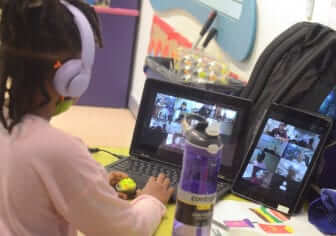
Vickie D. King/Mississippi Today
Kaylen Wade, 8, uses a laptop and tablet to participate in class via Zoom while at the Mississippi Children’s Museum.
After talking through several different iterations of what the museum’s role would be in 2020, they ultimately landed on creating a tuition-based program offering tutoring, after-school and day camp services for children in the metro area. The program was made by possible by generous private donations.
“We couldn’t just not use this great space with great WiFi and great staff and great educators. We knew we needed to be part of that (solution) and be a resource,” said Garrard. “We had already created this framework and had decided we wanted to be of service to children for their virtual learning.”
And now, thanks to around $165,000 in GEER funds, that programming is available to 40 pre-kindergarten through sixth grade students in the Jackson Public School District free of charge. The group represents 12 different schools, and the funding will last for these students for 16 weeks.
The impact of the pandemic on students in the capital city is huge. The all-virtual mode of school – in a high-poverty district where 25% of students currently do not have access to a device – was a major and challenging transition.
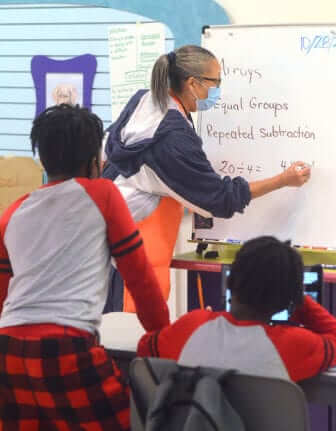
Vickie D. King/Mississippi Today
Twin brothers Armani and Amari Johnson, both 9, listens as academic tutor Marilyn Terrell, explains the math lessons for the boys after a glitch with the Zoom call. “Not to worry. Either way, we will get it done,” said Terrell.
Several weeks into the programming, at the end of the first nine weeks of school, Director of Museum Experiences Patti Reiss and other staff members were celebrating a win for one of the museum’s students.
“We learned today that one of the third graders is on the honor roll for the very first time,” said a beaming Reiss, who is also a certified teacher.
“We have (students from) 12 different JPS schools here,” Reiss said. “Usually in a public school district, who you go to school with is very much decided by geography.”
She said she’s seen students from different schools, like Isabel and Pecan Park Elementary Schools, discuss and help one another with schoolwork.
“This also puts everybody on an even playing field. You’ve got students in academic performing arts, magnet, traditional schools, and they’re all getting the same support and the same resources,” Monique Ealey, director of education and programs at the museum.
Ealey said the museum was able to purchase devices for students who did not have one.
Reiss and Ealey are very aware that many of their students’ needs stretch beyond the classroom.
“We have children who’ve experienced losses in their family, who may be displaced (due to COVID-19),” Ealey said.
In addition to the academic offerings the museum provides – including three certified teachers and two retired teachers and a host of staff members and volunteers — their past work with community partners such as the Center for Advancement of Youth means they can connect children with needed resources, she said.
“Having these GEER funds puts us in a position to not just support them academically, because right now in the middle of a pandemic, it’s much greater than that,” she said.
Students in the museum’s Launch into Learning program have the option of attending full-day ( 7:30 a.m. to 5:30 p.m) or part-day and after-school options. The children are grouped into age appropriate, socially distanced classrooms and begin each day with their virtual work, assisted by their museum teacher.
The students also received two meals and two snacks a day — a major benefit for an area where food security is often a challenge.
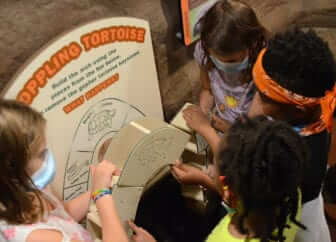
Vickie D. King/Mississippi Today
Children amuse themselves playing with the “Toppling Tortoise” and learn how different animals burrow underground.
Older children continue virtual work after lunch and the younger children engage in museum-directed instruction, including Spanish, health, nutrition, and literacy, among other subjects.
The remainder of the day is free play in the museum’s 20,000 square feet of indoor exhibits and 15,000 square feet of outdoor exhibits.
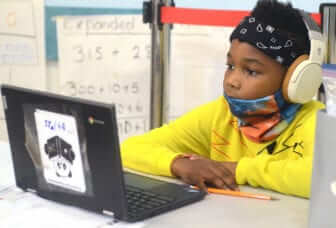
Vickie D. King/Mississippi Today
Jayden Brooks, 8, listens to his math teacher via Zoom.
Karen Cotton, the mother of 8-year-old Jayden Brooks and 11-year-old Adrian Brooks, said she’s grateful for the program. Adrian started the program using GEER funds in October, and Cotton said she’s noticed a difference in her son.
The ability to socialize and have more reliable internet access has been good for him, but virtual school remains a struggle.
“I can see a happier side of him — that’s a plus,” she said. “But school wise … we’re still working on it.”
Applicants for GEER funding that were not funded in the first round will have an opportunity to revise the application and re-submit in a third round taking place no later than Jan. 31 of next year, said Parker Briden, a spokesperson for Reeves’ office.
The post $5.4 million of governor’s emergency education funds issued statewide appeared first on Mississippi Today.
- Scientists: Genetic analysis could speed restoration of American chestnut trees, from Maine to Mississippi - February 14, 2026
- NAACP threatens to sue Elon Musk’s xAI over pollution in Mississippi - February 13, 2026
- School consolidation bill dies without a vote in Mississippi Senate - February 13, 2026